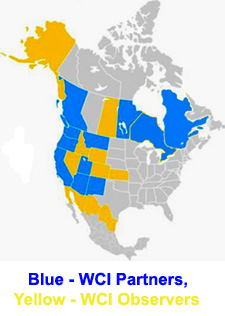Brad Plumer in The New Republic rightfully celebrates the emergence of the Western Climate Initiative, which establishes a cap-and-trade system among several US states and three of the most important Canadian provinces: British Columbia, Ontario, and Quebec. “Cap-and-trade is coming to the United States,†he notes, “and there is nothing that the Senate can do about it .â€
But maybe lawyers can, because it’s not clear that states and provinces can actually enact these sorts of arrangements. For the textualists among you, there is Article I, Section 10 of the Constitution, which provides that “no State shall enter into any Treaty, Alliance, or Confederation.â€Â I’m a little skeptical that any court would enforce this provision in this manner: after all, states have entered into hundreds of agreements and MOUs with their counterparts around the world.
More troubling for WCI is the federal government’s “Dormant Foreign Affairs Power,†which states that even if the federal government does not legislate on an issue, states cannot engage in foreign relations because that is reserved for federal control. The Supreme Court has rarely ruled on the issue. Four decades ago, in Zschernig v. Miller, it held that states could not deny certain property rights to citizens of Communist countries under the doctrine. More recently, in Crosby v. National Foreign Trade Council, the Court has struck down state boycotts of products from Burma because of countervailing federal policy. Crosby was a pretty easy case: there, Congress enacted a statute explicitly delegating to the President the authority to manage sanctions policy against the Burmese regime/
Most recently, however, in American Insurance Association v. Garamendi, the Court invalidated a California law that mandated certain disclosures of insurers who wanted to do business in the state. The issue concerns companies that might have been implicated in the Holocaust. California’s law forced insurers to disgorge information about their involvement; the Court said that the federal government had already worked out a deal with Swiss and German authorities. But unlike in Crosby, the â€federal policy†was not a statute but quite literally a letter from then-Deputy Secretary of the Treasury Stuart Eizenstat. Little wonder that Garamendi was a 5-4 decision.
Interestingly, this does not appear to be a doctrinal issue with an ideological base. In Garamendi, the dissent was joined by the unlikely combination of Ginsburg, Stevens, Scalia, and Thomas; Justice Souter, perhaps the Court’s greatest defender of state prerogatives, wrote the opinion for the majority (which is undoubtedly why then-Chief Justice Rehnquist assigned him the opinion).
Garamendi has been criticized by many commentators (including myself).  But it remains the law, and one could easily see a Palin or Romney Administration issuing “policy statements†explicitly designed to subvert WCI. Even the EPA’s endangerment finding might qualify under the Garamendi tripwire. It’s hardly a slam dunk, and it’s not obviously clear who would have standing to challenge the WCI trading scheme, but you can believe that the lawyers for polluters are working on it as I write this.

There are international, interstate compacts all the time. The Great Lakes Water compact, for example, included all of the Great Lakes States plus Ontario & Quebec. How is this different? In any event, the worst that could happen, it appears, is that the Canadian provinces and the American states would have to form their own system without commingling.
Hi Greg —
There are two short answers to your question. 1) The Great Lakes Compact is explicitly authorized by federal law IIRC: the feds give the states the authority to do it. Remember that President Bush had to sign the implementing legislation. 2) No one knows: it's not clear how far Garamendi will be extended. I'm suspicious, though, of a Supreme Court that is moving far to the right, although if Kennedy is still on board with Mass. v. EPA he's quite sensitive to state prerogatives in this area.
People who like the Western Climate Initiative should also favor Arizona's laws on illegal immigrants, right?
No.
This has been your daily dose of Short Answers to Stupid Questions.